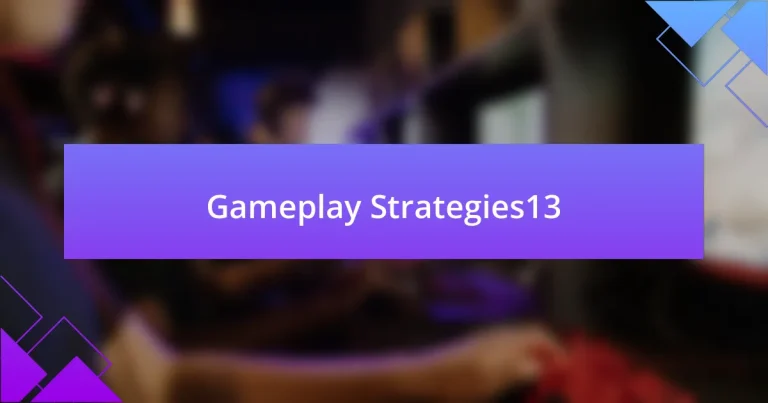The main entity of the article is the psychology of tilt in gaming, which refers to the emotional state of frustration, anger, or anxiety that negatively impacts players’ decision-making and performance. The article explores how tilt manifests in players, the psychological triggers that lead to this state, and its detrimental effects on gameplay and mental health. It emphasizes the importance of maintaining composure through emotional regulation techniques, mindfulness practices, and community support, while also discussing strategies for recognizing and managing tilt. Additionally, the article highlights the long-term consequences of repeated tilt, including burnout and decreased performance, and offers practical tips for players to avoid tilt in future games.

What is the Psychology of Tilt in Gaming?
The psychology of tilt in gaming refers to the emotional state where players experience frustration, anger, or anxiety, leading to poor decision-making and performance. This phenomenon often occurs after a series of negative outcomes, such as losing a match or making mistakes, which can trigger a loss of focus and control. Research indicates that tilt can significantly impact a player’s ability to perform optimally, as emotional responses can override rational thinking, resulting in impulsive actions and further losses. Understanding tilt is crucial for players aiming to maintain composure and improve their gaming performance.
How does tilt manifest in players during games?
Tilt manifests in players during games through emotional instability, leading to impulsive decision-making and decreased performance. Players experiencing tilt often exhibit frustration, anger, or anxiety, which can result in aggressive gameplay, poor strategic choices, and a lack of focus. Research indicates that tilt can be triggered by negative events, such as losing a critical match or making a significant mistake, causing players to react emotionally rather than rationally. This emotional response can lead to a downward spiral, where continued poor performance exacerbates feelings of tilt, further impairing decision-making and overall gameplay effectiveness.
What are the psychological triggers that lead to tilt?
Psychological triggers that lead to tilt include frustration, loss of control, and emotional investment. Frustration arises from repeated failures or perceived injustices during gameplay, causing players to react negatively. Loss of control occurs when players feel overwhelmed by circumstances, leading to impulsive decisions. Emotional investment intensifies reactions, as players who care deeply about outcomes may struggle to maintain composure when faced with setbacks. Research indicates that these triggers can significantly impair decision-making and performance, as evidenced by studies showing that emotional distress correlates with increased errors in competitive environments.
How does tilt affect decision-making in gameplay?
Tilt negatively impacts decision-making in gameplay by inducing emotional distress that leads to irrational choices. When players experience tilt, their cognitive functions are impaired, resulting in hasty decisions, increased aggression, and a tendency to chase losses rather than employing strategic gameplay. Research indicates that tilt can cause players to overlook critical game information and make suboptimal plays, ultimately diminishing their performance and increasing the likelihood of further losses. For instance, a study published in the Journal of Gambling Studies found that players in a tilted state were more likely to engage in riskier bets, demonstrating a clear correlation between emotional state and decision-making quality.
Why is maintaining composure important in gaming?
Maintaining composure is crucial in gaming because it directly influences performance and decision-making. When players remain calm, they can think clearly, strategize effectively, and react appropriately to in-game situations. Research indicates that emotional regulation, which is a key aspect of composure, can enhance focus and reduce errors during gameplay. For instance, a study published in the journal “Psychology of Sport and Exercise” found that athletes who practiced mindfulness and composure techniques experienced improved performance metrics and reduced anxiety levels. Thus, composure not only aids in maintaining a competitive edge but also fosters a more enjoyable gaming experience.
What are the consequences of losing composure during games?
Losing composure during games can lead to detrimental consequences such as poor decision-making, increased errors, and a negative impact on team dynamics. When players lose their composure, they often become overwhelmed by emotions, which can cloud their judgment and lead to impulsive actions. Research indicates that heightened emotional states can impair cognitive functions, resulting in mistakes that could have been avoided under calmer circumstances. Additionally, a loss of composure can create tension within the team, as teammates may become frustrated or demotivated by the erratic behavior, ultimately affecting overall performance and cohesion.
How does composure influence overall performance?
Composure significantly enhances overall performance by enabling individuals to maintain focus and make rational decisions under pressure. When individuals remain composed, they are less likely to succumb to stress-induced errors, which can negatively impact their performance. Research indicates that athletes who exhibit higher levels of composure tend to perform better in high-stakes situations, as they can manage their emotions and maintain clarity of thought. For instance, a study published in the Journal of Sports Psychology found that athletes with strong composure skills demonstrated improved performance metrics, such as accuracy and reaction time, compared to those who struggled with emotional regulation. This evidence underscores the critical role composure plays in optimizing performance outcomes.
What strategies can players use to recognize tilt?
Players can recognize tilt by monitoring their emotional and behavioral changes during gameplay. Self-awareness is crucial; players should regularly assess their feelings of frustration, anger, or anxiety, which are indicators of tilt. Additionally, players can establish specific triggers that lead to tilt, such as losing streaks or negative interactions with teammates. Keeping a journal to track these emotions and situations can provide insights into patterns of tilt. Research indicates that emotional regulation strategies, such as taking breaks or practicing mindfulness, can help players identify when they are tilting and take corrective action.
How can self-awareness help in identifying signs of tilt?
Self-awareness enhances the ability to identify signs of tilt by allowing individuals to recognize their emotional and cognitive states during gameplay. When players are self-aware, they can monitor their reactions to stressors, such as frustration or anxiety, which are often precursors to tilt. Research indicates that self-awareness is linked to emotional regulation, enabling players to detect shifts in their mindset or behavior that signal a loss of composure. For instance, studies show that individuals who practice mindfulness, a form of self-awareness, report greater emotional control and can better identify when they are becoming tilted, thus allowing them to take corrective actions before their performance is adversely affected.
What role does emotional regulation play in recognizing tilt?
Emotional regulation is crucial in recognizing tilt as it enables individuals to manage their emotional responses to stressors during gameplay. When players effectively regulate their emotions, they can maintain awareness of their mental state, allowing them to identify when they are experiencing tilt, characterized by frustration or anxiety that negatively impacts performance. Research indicates that players with strong emotional regulation skills are better equipped to recognize these shifts in their emotional state, which can lead to timely interventions to restore focus and composure. For instance, studies have shown that athletes who practice mindfulness and emotional awareness techniques report a greater ability to detect and address tilt, ultimately enhancing their performance and decision-making during critical moments in games.

How can players maintain composure during games?
Players can maintain composure during games by employing techniques such as deep breathing, positive self-talk, and visualization. Deep breathing helps regulate physiological responses to stress, allowing players to calm their nerves and focus on the task at hand. Positive self-talk reinforces confidence and reduces negative thoughts that can lead to panic or frustration. Visualization techniques enable players to mentally rehearse successful scenarios, which can enhance performance and reduce anxiety. Research indicates that athletes who practice these methods report lower levels of stress and improved focus during competitive situations, supporting their effectiveness in maintaining composure.
What techniques are effective for managing tilt?
Effective techniques for managing tilt include mindfulness meditation, cognitive restructuring, and controlled breathing exercises. Mindfulness meditation helps players become aware of their emotions and thoughts, allowing them to detach from negative feelings associated with tilt. Cognitive restructuring involves identifying and challenging irrational thoughts that contribute to tilt, promoting a more balanced perspective. Controlled breathing exercises can reduce physiological arousal and stress, helping players regain composure during high-pressure situations. Research indicates that these techniques can significantly improve emotional regulation and performance in competitive environments.
How can mindfulness practices help in maintaining composure?
Mindfulness practices help in maintaining composure by enhancing emotional regulation and reducing stress responses. These practices, such as meditation and focused breathing, train individuals to observe their thoughts and feelings without judgment, which allows for a more measured response to challenging situations. Research indicates that mindfulness can decrease the activity of the amygdala, the brain region associated with stress and emotional reactions, thereby promoting a calmer state of mind. A study published in the journal “Psychological Science” by Zeidan et al. (2010) found that participants who engaged in mindfulness meditation showed improved attention and emotional control compared to those who did not practice mindfulness. This evidence supports the effectiveness of mindfulness in fostering composure, particularly in high-pressure environments like competitive games.
What breathing exercises can be used to reduce stress during gameplay?
Deep breathing exercises can effectively reduce stress during gameplay. One effective technique is the 4-7-8 breathing method, where players inhale for four seconds, hold their breath for seven seconds, and exhale for eight seconds. This method has been shown to activate the parasympathetic nervous system, promoting relaxation and reducing anxiety. Another useful exercise is diaphragmatic breathing, which involves breathing deeply into the diaphragm rather than shallowly into the chest, helping to lower heart rate and stress levels. Research indicates that controlled breathing can significantly decrease cortisol levels, a hormone associated with stress, thereby enhancing focus and performance during gameplay.
Why is it important to have a pre-game mental routine?
A pre-game mental routine is important because it helps athletes focus, reduce anxiety, and enhance performance. By engaging in a consistent mental preparation process, athletes can create a sense of familiarity and control, which is crucial for optimal performance under pressure. Research indicates that routines can significantly lower stress levels and improve concentration, as seen in a study published in the Journal of Sports Sciences, which found that athletes who practiced mental routines reported higher confidence and better performance outcomes.
What elements should be included in a pre-game routine to prevent tilt?
A pre-game routine to prevent tilt should include mental preparation, physical warm-up, and goal setting. Mental preparation involves techniques such as visualization and mindfulness to enhance focus and reduce anxiety. Physical warm-up helps to increase blood flow and reduce tension, which can contribute to a calmer mindset. Goal setting establishes clear, achievable objectives for the game, promoting a sense of purpose and control. Research indicates that structured routines can significantly improve performance and emotional regulation, as seen in studies on athletes’ mental resilience.
How can visualization techniques aid in maintaining composure?
Visualization techniques can aid in maintaining composure by enabling individuals to mentally rehearse scenarios and outcomes, thereby reducing anxiety and enhancing focus. This mental practice allows players to create a clear image of successful performance, which can lead to increased confidence and a calmer mindset during high-pressure situations. Research indicates that athletes who engage in visualization experience lower levels of stress and improved emotional regulation, as evidenced by a study published in the Journal of Sports Psychology, which found that visualization significantly improved athletes’ ability to manage their emotions during competitions.
What role does community support play in managing tilt?
Community support plays a crucial role in managing tilt by providing emotional reinforcement and shared experiences among players. This support system helps individuals feel less isolated during frustrating moments, which can mitigate the negative emotional impact of tilt. Research indicates that social connections can enhance resilience, as players who engage with supportive communities often report lower levels of stress and frustration. For instance, a study published in the Journal of Applied Psychology found that social support significantly reduces emotional exhaustion and increases coping strategies among gamers. Thus, community support not only fosters a sense of belonging but also equips players with tools to manage their emotions effectively during gameplay.
How can discussing experiences with others help in coping with tilt?
Discussing experiences with others can significantly aid in coping with tilt by providing emotional support and shared understanding. When individuals share their feelings and experiences related to tilt, they often realize they are not alone in their struggles, which can reduce feelings of isolation and anxiety. Research indicates that social support is crucial for emotional regulation; for instance, a study published in the Journal of Personality and Social Psychology found that individuals who engage in supportive conversations experience lower stress levels and improved coping mechanisms. This exchange of experiences can also lead to practical strategies for managing tilt, as individuals can learn from each other’s approaches and insights, fostering resilience and better emotional control during gaming.
What are the benefits of having a gaming buddy for emotional support?
Having a gaming buddy for emotional support significantly enhances a player’s gaming experience by providing companionship, reducing stress, and improving overall mental well-being. The presence of a gaming buddy can help mitigate feelings of frustration and anxiety that often arise during challenging gameplay, as they offer encouragement and a sense of camaraderie. Research indicates that social support, such as that from a gaming partner, can lead to lower levels of cortisol, the stress hormone, thereby promoting a more positive gaming environment. Additionally, engaging with a buddy can foster a sense of accountability, encouraging players to maintain composure and focus, which is crucial in high-pressure gaming situations.

What are the long-term effects of tilt on players?
The long-term effects of tilt on players include decreased performance, increased stress levels, and potential burnout. Players who frequently experience tilt may develop a negative mindset, leading to poor decision-making and a decline in skill execution over time. Research indicates that chronic tilt can result in mental health issues, such as anxiety and depression, which further exacerbate performance problems. A study published in the Journal of Sports Psychology found that athletes who reported high levels of emotional distress due to tilt had significantly lower performance metrics compared to their peers.
How does repeated tilt impact a player’s mental health?
Repeated tilt negatively impacts a player’s mental health by increasing stress, anxiety, and frustration levels. This emotional turmoil can lead to a decline in overall well-being, as players may experience feelings of helplessness and decreased self-esteem. Research indicates that chronic exposure to tilt can result in burnout, which is characterized by emotional exhaustion and a reduced sense of accomplishment. A study published in the Journal of Occupational Health Psychology found that individuals who frequently experience negative emotional states, such as those caused by tilt, are more likely to suffer from mental health issues, including depression and anxiety disorders.
What are the signs of burnout related to tilt in gaming?
Signs of burnout related to tilt in gaming include emotional exhaustion, decreased performance, irritability, and a lack of motivation. Emotional exhaustion manifests as feelings of fatigue and frustration, often leading to a negative outlook on gaming. Decreased performance is evident when players struggle to maintain their usual skill level, resulting in frequent losses or mistakes. Irritability can surface as heightened sensitivity to in-game events, causing players to react more negatively than usual. Lastly, a lack of motivation may lead to disinterest in playing altogether, as players feel overwhelmed or disengaged from the gaming experience. These signs collectively indicate that a player is experiencing burnout due to tilt, which can significantly impact their overall enjoyment and performance in gaming.
How can tilt lead to a negative gaming experience over time?
Tilt can lead to a negative gaming experience over time by causing players to make irrational decisions and lose focus. When players experience tilt, their emotional state deteriorates, leading to frustration and anger, which can impair their judgment and gameplay performance. Research indicates that players in a tilted state are more likely to engage in risky behaviors, such as aggressive plays or ignoring strategic objectives, which can result in repeated losses and further emotional distress. Over time, this cycle of negative emotions and poor performance can diminish a player’s enjoyment of the game, leading to burnout and disengagement from gaming altogether.
What strategies can be implemented for long-term composure maintenance?
To maintain long-term composure, individuals can implement strategies such as mindfulness meditation, cognitive restructuring, and regular physical exercise. Mindfulness meditation enhances self-awareness and emotional regulation, allowing individuals to remain calm under pressure. Cognitive restructuring involves identifying and challenging negative thought patterns, which can reduce anxiety and improve focus during games. Regular physical exercise has been shown to decrease stress levels and improve mood, contributing to overall composure. Research indicates that mindfulness practices can lead to significant improvements in emotional regulation, as evidenced by a study published in the journal “Psychological Science” by Zeidan et al. (2010), which found that just a few sessions of mindfulness training can enhance attention and reduce stress.
How can players develop resilience against tilt over time?
Players can develop resilience against tilt over time by implementing consistent mental training techniques, such as mindfulness and cognitive restructuring. Mindfulness practices, like meditation, help players stay present and reduce emotional reactivity, while cognitive restructuring allows them to reframe negative thoughts into constructive ones. Research indicates that athletes who engage in mindfulness training report lower levels of anxiety and improved focus during high-pressure situations, which directly correlates with reduced tilt. Additionally, maintaining a growth mindset fosters resilience, as players learn to view setbacks as opportunities for improvement rather than failures. This approach is supported by studies showing that individuals with a growth mindset are more likely to persist through challenges and maintain emotional control.
What role does regular self-reflection play in managing tilt?
Regular self-reflection plays a crucial role in managing tilt by enabling individuals to recognize and understand their emotional triggers during gameplay. This process allows players to identify patterns in their reactions, which can lead to improved emotional regulation and decision-making. Research indicates that self-reflection enhances self-awareness, which is essential for mitigating negative emotions associated with tilt. For instance, a study published in the Journal of Personality and Social Psychology found that individuals who engage in regular self-reflection are better equipped to cope with stress and maintain focus, thereby reducing the likelihood of tilt during competitive situations.
What practical tips can players use to avoid tilt in future games?
Players can avoid tilt in future games by implementing strategies such as setting realistic expectations, taking regular breaks, and practicing mindfulness techniques. Setting realistic expectations helps players maintain a balanced perspective on their performance, reducing frustration when outcomes do not meet their hopes. Taking regular breaks allows players to reset their mental state, preventing the accumulation of stress and negative emotions during extended play sessions. Mindfulness techniques, such as deep breathing or visualization, can enhance emotional regulation, enabling players to stay focused and composed even in challenging situations. Research indicates that mindfulness practices can significantly reduce stress and improve emotional control, which supports the effectiveness of these strategies in mitigating tilt.















